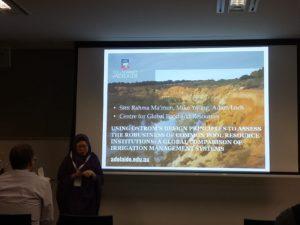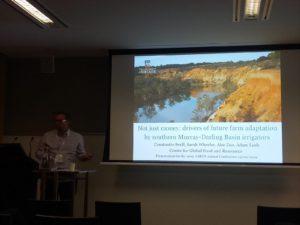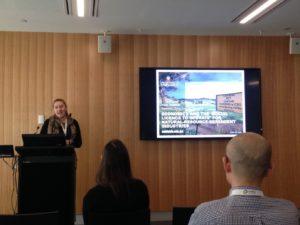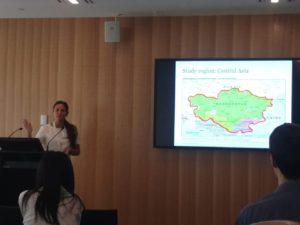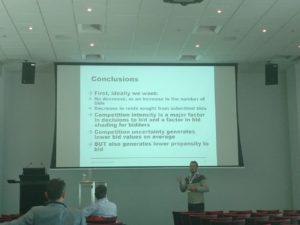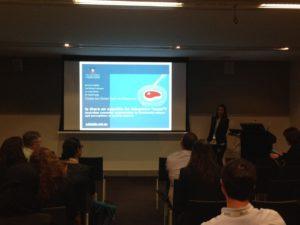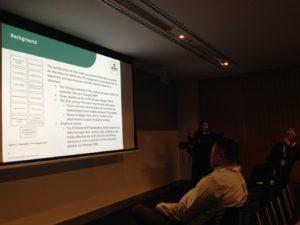Day 2 at AARES Conference
Global Food and Resources PhD students Apri Sayekti , Phassara Khamthara and Rida Akzar recap the second day of the annual Australasian Agricultural and Resource Economics Society (AARES) conference.
Prof. Wendy Umberger presented findings from work done with her PhD student Jesmin Rupa. The paper focused on understanding the impacts of food westernization on the diet quality in Vietnam. The talk highlighted that the increasing penetration of western food has negative impacts on diet quality leading to health problems such as non-communicable diseases, which demands further policy attention. This study is part of an Australian Centre for International Agricultural Research (ACIAR) project that looks at addressing a number of knowledge and data gaps with a focus on understanding changing consumption patterns in the large and rapidly emerging urban areas in Vietnam.
Dr. Alexandra Peralta presented a paper on trust of coffee growers and traders in rural Uganda using experimental methods. The research is part of an Australian Centre for International Agricultural Research (ACIAR) project aimed at developing value chain innovation platforms to improve food security in East and Southern Africa. The findings suggest the trust level among coffee growers and traders are low. Interestingly, growers trust traders more than among growers trust.
GFAR PhD student Sitti Rahma Ma’Mun in the natural resource management session presented her research that is investigating the robustness of common pool resource institutions using Ostrom’s design principles. Her findings suggest that, there are four necessary conditions for robust institution of irrigation system. Out of the four, the clearly defined (users and physical) boundaries is the most important condition that leads to a long-lasting irrigation institution.
Another GFAR PhD student Constantin Seidl presented his research which focuses on the factors that drive future farm adaptation by irrigators of southern Murray Darling Basin. The findings show that farm financial factors such as irrigators’ debt, income and land value are some of the most significant influences on the three groups of future adaptation strategies, expansive, accommodating, and contractive. However, non-monetary factors, particularly farm succession planning and climate change risk perception also have an important influence.
Nikki Dumbrell presented her preliminary research work in her PhD which focuses on the economics and ‘social licence to operate’ in natural-resources-dependent industries. Nikki highlighted that the measure of social licence is still debateable among the societies. Additionally, the social licence may affect the decision-making of consumers, policy makers and the resource users (e.g. farmers). Nikki received valuable suggestions from the audience on the way forward to proceed with her research.
GFAR PhD student Alfinura Sharafeyeva presented her research on trade costs and Agri-food exports in Central Asia. The analysis using Structural gravity model indicates that it takes a long time to get to and pass the border decreases the exports of fruits and vegetables in Central Asia. Moreover, long distances to trading partners remains a significant impediment for Central Asia’s export compared to the rest of the world.
GFAR researcher Dr. Daniel Gregg spoke in the morning mini-symposium “Can conservation auctions work when bidder costs, competition or outcomes are uncertain?” His research along with co-author Dr. Patrick O’Connor focuses on participation and bidder behaviour in reverse auctions with anticipated regrets and competition uncertainty. His work suggests competition uncertainty generates lower bid values on average but also generates lower propensity to bid. Moreover. Competition intensity is a major factor in decisions to bid and a factor in bid shading for bidders.
Another speaker in this session was Dr. Stuart Whitten from CSIRO Land and Water. His work focuses on design and performance of a water quality tender, focusing on Reef Trust Tenders in Queensland. His research shows that reef trust tendering approach was a success with total costs of around 17 million.
GFAR PhD student Livia Padilha presented work from her PhD co-authored with Prof. Wendy Umberger, Dr. Lenka Malek and Dr. Daniel Gregg that looks at the perception of plant-based and lab-grown “meat” among Australian consumers. Results from her work provide insights toward the demand for new types of alternative protein sources.
Another interesting talk of the day was by Dr Dias Satria of University of Brawijaya, who is also an alumni of University of Adelaide. His research focuses on the food consumption pattern of urban and rural people in East Java Indonesia. He pointed out that socioeconomic characteristics such as age, household employment and education significantly influence the consumption pattern. Additionally, the rural households were found to be more sensitive to changes in food prices than urban household.
GFAR Adjunct Lecturer, Dr. Risti Permani presented her research paper on the price-to-market analysis and the ‘FTA-introduced Asymmetries’ in the case of Australian dairy exports. The findings show that reducing tariff does not necessarily reduce the export prices. Her work emphasises an important implication to consider by the dairy exporters in Australia.
Later in the afternoon, Prof. John Freebairn gave his talk regarding green gas emissions policy in the Keith Campbell Distinguished Lecture session. There are design options of mitigation policy options such as tax, trading scheme, regulation, subsidy, and combination of them to reduce greenhouse gas emissions. His talk highlighted a price on pollution design such as tax with particular necessary conditions.
All in all it was an exciting second day of the conference with a number of invigorating talks on a broad range of topics from the agricultural and resource economics spectrum.

